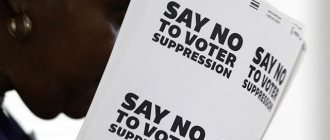ST 280 of the Criminal Code of the Russian Federation.
1. Public calls to carry out extremist activities - shall be punishable by a fine in the amount of one hundred thousand to three hundred thousand rubles, or in the amount of the wages or other income of the convicted person for a period of one to two years, or by forced labor for a term of up to three years, or by arrest for a term of four to six months, or imprisonment for a term of up to four years with deprivation of the right to hold certain positions or engage in certain activities for the same period.
2. The same acts committed using the media or information and telecommunication networks, including the Internet, are punishable by forced labor for up to five years with deprivation of the right to hold certain positions or engage in certain activities for up to three years. or without it, or imprisonment for a term of up to five years with deprivation of the right to hold certain positions or engage in certain activities for a term of up to three years.
Commentary to Art. 280 Criminal Code
1. In Art. 1 of the Federal Law of July 25, 2002 N 114-FZ “On Combating Extremist Activities” provides a wide list of acts that fall under the concept of extremist activity (extremism). Among other things, extremism includes a violent change in the foundations of the constitutional system and violation of the integrity of the Russian Federation; public justification of terrorism and other terrorist activities; inciting social, racial, national or religious hatred; obstruction of the legitimate activities of government agencies, propaganda and public display of Nazi paraphernalia or symbols; mass distribution of obviously extremist materials, etc.
2. The objective side is expressed in the form of action: public calls to carry out extremist activities. Public appeals are an active appeal (campaign) to citizens in oral, written or other form (using technical means, including the Internet) to influence them in order to incline them to extremist actions. Calls can be expressed in speeches at rallies, meetings, other public events, in the form of extremist slogans during demonstrations, marches, etc. These actions using the media, information and telecommunication networks, including the Internet (Part 2) , form a qualified crime. On the objective signs of a crime, also see paragraph 4 of the Resolution of the Plenum of the Supreme Court of the Russian Federation of June 28, 2011 No. 11 “On judicial practice in criminal cases involving crimes of an extremist nature.”
3. The crime is considered completed from the moment of public proclamation (dissemination) of at least one appeal, regardless of the achievement of the set goals.
Points 11 - 14
Paragraphs 11 to 14 contain provisions regarding bureaucratic crimes, anti-people actions during the Civil War (and later the Great Patriotic War), preparation of terrorist attacks, and so on.
They called the person affected by this article an enemy of the people. Such people, as mentioned above, were executed, expelled from the country, and sat in prisons and camps. Many of those convicted under Article 58 were those who really deserved it, but there were also those who were unfairly accused of treason. At that time, the security agencies were of little interest in the truth, so confessions from those who came to attention under this article were simply knocked out. There is a lot of evidence about this from that time. Those who served their sentences remained under supervision for a long time. They were forbidden to get a job, receive pensions, apartments, they were limited in the opportunities that an ordinary Soviet citizen had.
Article 58 during the time of Stalin was the most popular document that made it possible to repress civilians and military personnel. However, already during Khrushchev’s time a special commission was organized that investigated these crimes. Many of those unjustly convicted were, unfortunately, posthumously rehabilitated. Those who survived were returned to their previous rights and privileges.
Any state must protect its territorial integrity and constitutional rights. Article 58 of the USSR was just such a guarantor of protection. Of course, now such harsh penalties can be considered a flagrant violation of human rights, but in those days, Article 58 seemed appropriate and really gave fair punishment to those who plotted a crime against Soviet power.
Second commentary to Art. 280 of the Criminal Code of the Russian Federation
1. The object of the crime is social relations and interests related to the implementation of the constitutional prohibition of inciting racial, national or religious hatred.
2. The objective side of the crime is characterized by actions - public calls for extremist activities.
The concept of extremist activity (extremism) is given in the Federal Law “On Combating Extremist Activities” (as amended by Federal Law No. 211-FZ dated July 24, 2007).
Extremist activities can be carried out with the help of extremist materials. They are understood as documents intended for publication or information on other media that call for the implementation of extremist activities or substantiate or justify the need for such activities.
Calls to carry out extremist activities mean inflammatory actions, verbal or written, aimed at achieving a specified goal. These calls must be public, which means that they are made directly in the presence of third parties or (if they are written) with the expectation that other persons will become familiar with them later (for example, by sticking posters or slogans with relevant content). The expectation of becoming familiar with the content of other people's appeals in the future may also be characteristic of oral appeals through the use of, for example, tape recordings.
3. The subject of the crime is a person who has reached the age of 16.
4. The subjective side of the crime is characterized by direct intent.
5. Part 2 art. 280 of the Criminal Code establishes increased liability for public calls made using the media. They are understood as appeals published in the press, using radio, television and other media.
Paragraph 1
Paragraph 1a contains provisions regarding treason, namely defection to the enemy, giving state secrets to the enemy, espionage, and flight abroad. For these crimes, the highest punishment was execution, and in mitigating circumstances - imprisonment for a period of 10 years with confiscation (full or partial) of property. A few words should be said about this. Since the USSR at that time was in a very hostile environment, it is not surprising that flight (precisely flight, and not leaving the country) was punished so strictly, because in fact it was the same treason.
Paragraph 1b contains the same provisions as 1a, but this time applies to persons in military service. And there is no doubt that the same crimes committed by a person liable for military service are more serious, however, if these crimes have any gradation at all. So it is not surprising that the Criminal Code of the RSFSR punishes the military so severely.
Paragraph 1c establishes the responsibility of families of military personnel who committed a crime. If family members knew about the impending crime, but did not report it to the authorities or contributed to its commission, then they are sentenced to a term of 5 to 10 years in prison with confiscation of property. This point can be considered one of the most inhumane in the entire article, but, as a study of the archives showed, only 0.6% of all political prisoners served sentences under this point, that is, it was rarely used. The Criminal Code of the RSFSR can generally be called inhumane, but due to the realities of that time, it seemed appropriate to the authorities.
Paragraph 1d provides for punishment for failure to inform military personnel about impending treason. For a military man at that time this was a direct responsibility, so it is not surprising that it was punished so severely. As for civilians, there was clause 12, which provided for the same penalties. But with the system of that time, the punishment that now seems cruel seemed quite logical, because at that time there were no liberal thoughts.
If the dispute reaches the court or judicial practice
In court cases with harmful clients, entrepreneurs are also protected by the prohibition of abuse of rights from Art. 10 Civil Code of the Russian Federation. When a person abuses the law, the court rejects the claim.
If this is your case, show exactly what the abuse is like in these examples.
1. A woman bought a down jacket in a store for 24,000 rubles. The down jacket was too big and the store offered adjustments based on sleeve length and hood depth. The woman agreed and agreed on six days.
The down jacket was sewn in, but the woman did not come after six days. Nine days later, the woman asked for the money back because she no longer liked the model. The down jacket had already been customized for the customer, so the store refused to return it. Then the woman went to court and asked for 24,000 rubles for the purchase, 200 rubles of interest for the delay in returning the money, 10,000 rubles for compensation for moral damage, 32,000 for legal assistance and a 32,000 rubles fine for the store’s refusal to pay voluntarily.
The woman was not awarded a penny. The court found that she was abusing her right. The buyer herself agreed to have the product adjusted, and then refused. Now the down jacket cannot be sold. Therefore, the store has the right not to accept it - case No. 33-11245/2018.
2. A man bought a sewer cleaning machine from a catalog for 405,000 rubles. Eight months later, the man sent the store a demand for a refund. He explained that the seller sent instructions for the car in a foreign language without translation. It is impossible to use the machine without instructions.
The seller refused to refund the money. Then the man filed a lawsuit demanding the return of 405,000 rubles for the car, 20,250 rubles in penalties, 8,000 rubles for the cost of delivering the car back to the store, 5,000 rubles for moral damages and 10,000 for the lawyer’s fees.
The man lost because the court found an abuse of the law.
The seller explained at the meeting that three weeks after the purchase he sent instructions in Russian to the address of the man’s friend. There was a witness to this.
He received the instructions, which means he can use the machine. The cleaning machine is not a seasonal product, which means that claims must be made within a reasonable time, and not after eight months. You cannot make money from minor store mistakes - case No. 33-5794/2017.



